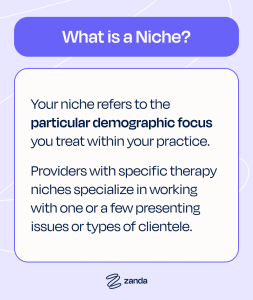This article is written by Nicole Arzt, LMFT
Niching down in your practice is one of the most effective ways to ensure you work with your ideal clients. Clearly defining your target clients allows you to fine-tune your marketing efforts and tailor your networking strategy to better reach those individuals. While some professionals identify their niche right away, others need to develop it intentionally.
In this article, we’ll provide an overview of the key steps to finding your niche in private practice.
What is a Niche?
Your niche refers to the particular demographic focus you treat within your practice. Providers with specific therapy niches specialize in working with one or a few presenting issues or types of clientele.
Healthcare providers may niche down by working with a:
- Designated mental or physical health condition
- Demographic group (i.e. children, women over 40, adolescents, or middle-aged adults)
- Particular therapeutic modalities like CBT or EMDR
- Cultural identity (LGBTQ+, clients within the BIPOC community)
For example, a therapist might decide to specialize in treating adolescent depression. Even if that demographic isn’t their sole focus, they intentionally concentrate their marketing, networking, and training efforts to strengthen their skills within this niche. Similarly, a physical therapist might have a niche in postpartum pelvic floor health. This therapist also focuses their efforts on that population.
It’s possible to have more than one niche – however, the overarching idea is that you strive to create a practice that speaks to specific clients (rather than trying to appeal to everyone!).
Finding Your Niche
You don’t necessarily need to have a designated niche before forming your private practice. Sometimes, it’s more helpful to gain experience working with a variety of clients before niching down. When you’re just starting, you may not truly know your strengths and preferences just yet.
However, if you feel ready to find your niche, here are some steps that may help:
- Consider your favorite types of clients: Which clients most energize you? Where do you naturally seek more training or education? Better yet, if you could fill your current caseload with any type of client, what similarities would those clients have?
- Consider your least favorite types of clients: Nobody can work well with everyone. Which clients make you feel anxious, full of dread, or apathetic? What traits or presenting issues do those individuals have in common?
- Take action toward strengthening your skills: As you start formulating a niche, you should consider how and where you can seek more training and specialization. Gaining expertise sets you apart, and it can help you feel more competent to treat such clients.
The Business Side of Finding Your Niche
The Japanese concept, ikigai, translates to “reason for being.” Within the context of your business, having a strong sense of purpose can create momentum and excitement. These compelling feelings can help you navigate the inevitable challenges that may arise.
But regardless of your emotions, all professionals must balance passion with practicality. Even if you feel excited about certain mental health niches, that doesn’t guarantee a significant demand for services. Likewise, if you feel drawn to a well-known, saturated niche, attracting potential clients can feel more challenging. You might feel like you’re competing with other professionals to build your practice.
This is why it’s important to research your current market. For instance, how much demand is there for your desired service? How many other providers offer the same (or similar) work? If you’re interested in a more popular niche, what do you provide (or what might you provide) that sets you apart? Knowing these answers can refine your marketing and concentrate your training efforts.
Marketing Your Practice
Once you decide on your niche, it’s time to focus on marketing your practice. First things first – no perfect formula works effectively for all providers. You may need to try a few different strategies before finding a solution that works best for you. You might also need to revisit these strategies every few months to ensure your efforts convert to clients.
- Update your website: Your practice website is your virtual billboard – it’s, by far, one of the best investments you can make for your business. Don’t neglect taking care of it, and don’t skimp on graphic design or compelling copy. As you niche down, your website should reflect your target demographic. It should clearly speak to the people you want to attract. If an ideal client lands on your page, you want them to read, Oh, this is me! This person speaks to me!
- Spend time on local SEO: Focusing on local SEO helps drive local traffic to your website. This is especially important for professionals operating brick-and-mortar businesses. To improve your local SEO, update your Google Business Profile with accurate information about your business. Use location-specific keywords on your website and aim to add your website to local directories.
- Start a blog: Blogging is another fantastic method for improving site traffic. Regular blogging on your practice website establishes a sense of authority, grows your audience, and creates excellent content for social media, newsletters, and more. Moreover, as you narrow your niche down, it generally becomes easier to write for your ideal clients. If you’re concerned about consistency, start by posting just one or two times a month. Remember that quality is always superior to quantity.
- Build your professional network: Word-of-mouth referrals are one of the best ways to secure business in your practice. You can use your networking skills at any industry-specific event, including conferences, meetups, and trainings. Furthermore, consider getting more active on social media – there are many mental health communities where professionals seek referrals for services. Make sure you balance “giving” with “receiving”. The more you help others, the more likely they are to remember your name.
Conclusion
Therapists have the potential to help so many types of clients. However, narrowing down your niche allows you to truly focus on and excel at working with a specific population. This makes it easier to know how and where to market your practice, and it can simplify which professional training you pursue.
Zanda offers all the tools you need to both build and grow your private practice. Our comprehensive system is intuitive, affordable, and helps you buzz through the busy work. Get started with a 14-day free trial today!
Nicole Arzt is a licensed marriage and family therapist and author working in private practice in Orange County, CA. Nicole has worked in various settings throughout her career, including hospitals, schools, nonprofit community health clinics, and private practice.







